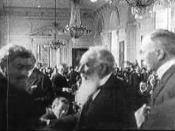This book is about negotiations and is based on the Harvard Negotiation Project. This is written in APA format.
Getting to Yes: Negotiating Agreement Without Giving In
In cooperation, Roger Fisher, William Ury, and Bruce Patton authored the book, Getting to Yes: Negotiating Agreement Without Giving In, to educate readers on how to become better, more effective negotiators. They start with describing their four principles for effective negotiation: People, Interests, Options, and Criteria. In addition, they describe three common obstacles to negotiation - when the other party is more powerful, what if they won't play, and when the other party uses dirty tricks - and discuss ways to overcome those obstacles. They also emphasize that all four negotiation principles should be used throughout all three phases of the negotiation process: analysis, planning, and discussion.
Separating People and Issues
The first principle is to separate the people from the issues.
People tend to take positions on a matter and become personally involved in their positions. Thus, they tend to take responses to the issues as personal attacks. The three main reasons why people do that, according to Fisher and Ury, are emotions, communication (or lack thereof), and different perceptions of the problem. Separating people from the issues allows the parties involved to address the issues without damaging their relationship.
Focus on Interests, Not Positions
Rather than focusing on positions, a good agreement focuses on the parties' interests. When a problem is addressed by focusing on the underlying interests, it is more likely that a solution will be found that satisfies both parties. Determining what these interests are can be accomplished by asking questions such as, "Why is this an interest to them?" and/or "Why is this not of interest to them?" In other words, try to view things from the...


